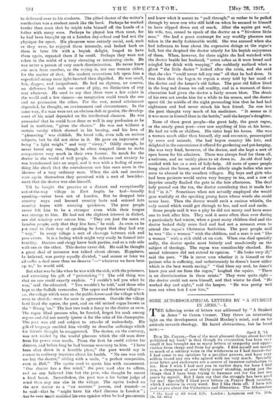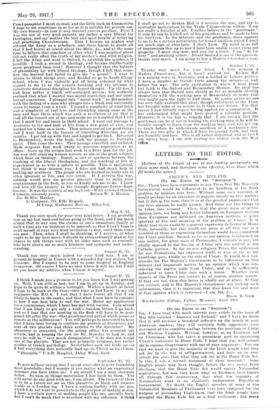SOME AUTOBIOGRAPHICAL LETTERS BY "A STUDENT IN ARMS."—I.
THE following series of letters was addressed by "A Student in Arms" to Canon Cromer. They throw an interesting light on the development of Donald Hankey's mind, and on his attitude towards theology. He hated abstractions, but he loved
men :— April 9, '15.
Demi fii. Camien,—One of the most pleasant things about having published my books is that though its circulation has been very small it has brought me so many letters of sympathy and- appre- ciation from clergy and from lay people. I find myself not nearly so much of a solitary voice in the wilderness as I'had feared—for I had come to my opinions by a peculiar process, and have very seldom found any one who agreed with me very much. Specially your letter and enclosures are a source of immense satisfaction to me. How I wish I had met you in earlier days, for here I find you, a clergyman of over thirty years' standing, saying just the things that I have been trying to hammer out for the last ten years by myself. But I dare say that the struggle has been good for me I Specially I liked your letters on-Prayer Book revision, which I endorse in every word. But I like them all. I have felt just as you about the Unitarians and Dissenteis. The Atharcasian
- -
• Thc Lord of AU Good. Life. London ; Longmares and Co. 1014. [2s. 6d. net.] Creed-pamphlet I must re-read, and the -little .book on Communion I hope to use sometimes in so far as it is suitable for private use.. My own history—in case it may interest you—is peculiar. First I was the son of very good parents, my father a very liberal lay theologian, -and my-mother the best and most lovable of believing and practising Churchwomen. Next I' became an orphan and entered the Army as a subaltern, and there karat to doubt all that I had learnt at school about the Bible. Isc., and at the same, time to believe that somehow or other what I was sceptical about did not really affect the truth of my mother's real vital religion. I left the Army and went to Oxford, to establish the synthesis if possible. I took a second in Theology, and became intellectually more perplexed than ever! However I thought that the balance of plausibility lay with liberal theology, though I felt that some- how the learned had failed to give me "a gospel." I went to Africa to think things over, and decided to go to Leeds Clergy School, where I was violently put off being ordained by what seemed to me to be the evasive teaching and the attempt to substitute devotional discipline for honest thought. Up till now I had been rather a timid, self-contained person; but suddenly realized that what I wanted was moral conviction and not intel- lectual conviction. I plunged into "social work" in Bermondsey with the feeling of a man who plunges into a black and unfriendly ocean to escape from a wreck. I found a simplicity of vital faith and a simplicity of real love and friendship among some of the men and boys there which was such a revelation of joy that it took all the conceit out of me, and made me so humbled that I felt that I must try and learn in their school. I went out steerage to Australia to try and look at life from a new point of view, and worked for a time on a farm. Then nature craved for good things and I went back to the luxury of travelling first-class for six months. I got fed up with that and longed to get back. Returned to Bermondsey, wrote the book, took my passage to Australia again. Then came the war. Then passage cancelled, and enlisted. Made sergeant first week owing to previous experience as an officer. Gave up the stripes last week to a fitter man for the job. Am now still studying human nature, as one of the great subjects which bear on theology. Result, a sort of synthesis -between the teaching of the liberal theologians, and the teaching of life as experienced in as wide a sphere as possible. This is egotistical, but think it may interest you. I have not had much help in making my synthesis. The people who are learned in books are so often ignorant of life, and vice versa. If I survive the war, nothing would give me greater pleasure than to make your acquaintance in the flesh, as you so kindly ask me to do. I know and love all the country in the triangle Brighton—Lewes—East- bourne. It was the country of my boyhood.—With renewed thanks,
C Company, 7th Rifle Brigade, St Camp, Ruslimoor Bottom, Aldershot.



























 Previous page
Previous page